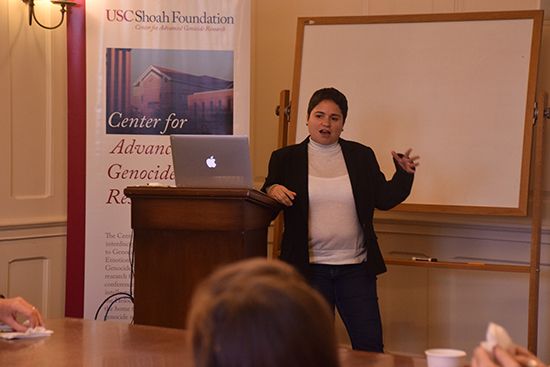Center Fellow Paula Cuellar Cuellar Speaks on Genocide and Scorched Earth in Guatemala and El Salvador

On the heels of USC Shoah Foundation Center for Advanced Genocide Research’s international conference on genocide and resistance in Guatemala, the 2016-17 Center Graduate Research Fellow Paula Cuellar Cuellar gave a lecture about her own research of scorched earth as an integral part of the genocides in Guatemala and El Salvador.
Cuellar is a Ph.D. candidate in history and human rights at the University of Minnesota. She received her master’s in Human Rights and Education for Peace from the University of El Salvador and master of laws degree from the University of Notre Dame. She is published in Revista de Estudios Centroamericanos, Journal for the Study of Peace and Conflict, and Revista IIDH.
Cuellar was in residence at USC Shoah Foundation from August to September 2016, watching the Institute’s new Guatemalan Genocide testimonies. She paid particular attention to whether the survivors describe any actions by the genocide perpetrators and the state that could be classified as “scorched earth operations.”
Cuellar defined scorched earth as a deliberate attempt by the state to deprive the targeted “enemy” population of supplies, information and a place to hide. It is the annihilation of one or more entire villages during a single operation, including destruction of crops, burning of homes and possessions, and massacres of the whole population of the village, including women and children.
In many cases, the men of the village have already been targeted as guerillas and have fled or been murdered before the army even arrives. But the destruction and killings are carried out anyway, even though the only people left in the village are women, children and elderly.
The aim is to completely dismantle the social structures of these villages that could potentially support the guerilla forces.
“It’s the outcome of the expression ‘taking water from fish,’” Cuellar said.
In USC Shoah Foundation’s Guatemalan testimonies, Cuellar heard survivor accounts that convinced her that scorched earth happened there during the genocide, similar to the scorched earth operations in El Salvador in the 1980s – even though the survivors didn’t recognize it as such.
“Guatemalans don’t define themselves as victims of scorched earth – they just say ‘massacre,’” Cuellar said. “But the descriptions are the same [as in El Salvador].”
In the second part of her lecture, Cuellar discussed her criticisms of “genocide” as defined by the Convention on the Prevention and Punishment of the Crime of Genocide. She argued for an expansion of the kinds of persecuted groups (specifically, political, social and economic) that should be legally protected by the Convention but currently are not. She also noted that the degree of “intent” required for an act to be considered genocide is open for interpretation.
Finally, Cuellar spoke about the experience of watching the Guatemalan testimonies in the Visual History Archive. They were so powerful that she even became emotional while watching them.
“It was amazing to see how people survived in the jungle for 14 years or more” after being forced to flee their homes with virtually no resources, Cuellar said. “There was total desolation in the places they left behind.”
She also praised the interviewers for being respectful of the survivors and asking not only about the genocide but also their childhoods and life before the violence.
“They remember their childhood and go back to joyful memories – you see smiles before going back to tears,” Cuellar said. “I found the testimonies amazing.”